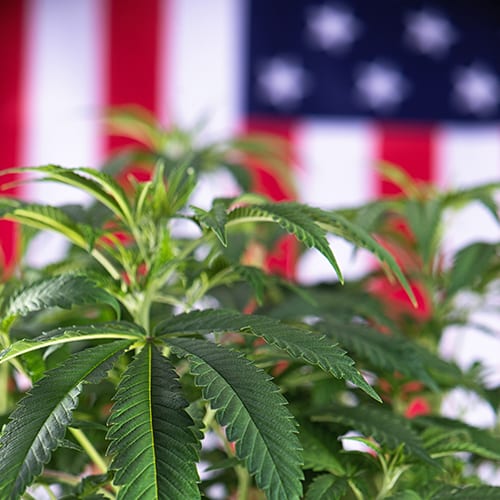
The House Veterans’ Affairs Subcommittee on Health held a legislative hearing April 30th to discuss three separate bills concerning veterans’ access to cannabis: the Veterans Equal Access Act (Equal Access Act), the Veterans Cannabis Use for Safe Healing Act (Safe Healing Act), and the VA Medicinal Cannabis Research Act (Cannabis Research Act).
Because marijuana remains illegal under federal law, veterans currently cannot get a recommendation for medical marijuana through the Department of Veterans Affairs (VA). Rep. Earl Blumenauer (D-OR) therefore introduced the Equal Access Act, which would allow health care providers at the VA to provide recommendations and opinions to veterans concerning medicinal marijuana.
The Safe Healing Act, sponsored by Rep. Greg Steube (R-FL), would accomplish a similar goal by codifying into federal law an existing Veterans Affairs administrative policy that protects veterans from losing their benefits because of cannabis use in states where such use is legal under state law.
The third cannabis-related bill discussed yesterday–the Cannabis Research Act–authorizes the VA to conduct and support research concerning the efficacy and safety of cannabis as a treatment for veterans. That legislation, sponsored by Rep. Lou Correa (D-CA), would facilitate research concerning medical marijuana treatment for veterans enrolled in the VA health care system.
At the subcommittee hearing on Tuesday, Ranking Member Rep. Tom Cole (R-OK) said that he “could not agree more” that research should be conducted on medical marijuana. He also opined that marijuana’s status should be moved from Schedule I to Schedule II in the Controlled Substances Act.
Rep. Blumenauer “recognized a tragedy” in that “[w]e sent more than two million brave men and women [to Iraq and Afghanistan] to fight in very difficult circumstances to say the least” and now “lethal opioid overdoses among VA patients are almost twice the national average.” With respect to medical marijuana, Rep. Blumenauer noted, “VA physicians should not be denied the ability to offer recommendations they think might meet the needs of their patients. Veterans should not be forced outside the VA system to seek a treatment that is legal in their state.”
To that end, Rep. Max Rose (D-NY) stated: “[A]s a more recent vet and someone who still serves in the [National] Guard, we need to utilize all tools available to us to deal with folks as they are still encountering the wounds of combat and of service.”
Another veteran and member of the Subcommittee, Rep. Conor Lamb (D-PA), observed at the hearing, “we have to look at the VA as an institution that can lead, that can break new ground, that can cross these frontiers, and when there’s innovation and reform in health care we need to be at the front, not behind, not entrenched in the old way of doing things.”
Dr. Keita Franklin, the VA National Director of Suicide Prevention, provided a statement at the hearing. Franklin said that the VA currently supports a clinical trial of cannabis for the treatment of PTSD. However, she added, the VA does not support the Cannabis Research Act. “Please know,” she testified, “that our existing policy in VHA already permits discussion and documentation and clearly states that veterans will not be denied benefits by discussing this information with a VHA provider.”
In response, Rep. Greg Steube (R-FL), expressed a need to address veterans’ confusion concerning the consequences of using cannabis. According to Congressman Steube, several veterans in his district believe that they will not be able to get VA services if they test positive for THC, even if they used it in accordance with state law. He therefore believes that federal legislation clarifying veterans may indeed use medical cannabis in accordance with state law, without risk of losing VA benefits, would be helpful.
Carlos Fuentes, the National Legislative Director at Veterans of Foreign Wars (VFW), also testified at the hearing. He said the VFW is “[p]roud to support” the Cannabis Research Act. According to Fuentes, medical cannabis “is a more suitable option than the drug cocktails the VA prescribes.” He cited a study that found veterans experience chronic pain 40 percent more than non-veterans. He added that the VFW supports the intent of the Veterans Equal Access Act, but cannot offer its support at this time because it does not want to do so if the VA itself cannot directly provide the recommended treatment.
Stephanie Mullen, the Research Director for Iraq and Afghanistan Veterans of America (IAVA), testified that 83 percent of IAVA’s members believe cannabis should be legal for medical use, and 90 percent think it should be researched for medicinal uses. “IAVA members are calling for cannabis research, and it is time for the Department of Veterans Affairs to catch up,” she said. “If Veterans are unable to go through VA to get medical cannabis, they’ll go around it, but veterans shouldn’t feel they have to hide and circumvent VA to access the standard of care their civilian counterparts can access easily.” According to Mullen, the IAVA is proud to support the Equal Access Act, Safe Healing Act and the Medicinal Cannabis Research Act.
Even if none of the bills discussed at yesterday’s hearings becomes law, pro-cannabis members of Congress are making progress. By taking-up standalone cannabis bills in an incremental fashion, pro-cannabis members of Congress believe that their efforts ultimately will lead to broader marijuana reform. With more veterans groups now supporting medical marijuana as an effective treatment for illnesses or disabilities that veterans acquired as a direct result of service to the nation, it appears to be only a matter of time before the federal government facilitates our veterans’ access to medical cannabis.
Robert Kline is a partner at McDermott Will & Emery and a member of the firm’s Cannabis Industry Group.
Jeff Miller is a senior legislative advisor at McDermott.
Source: cannabisdispensarymag.com





